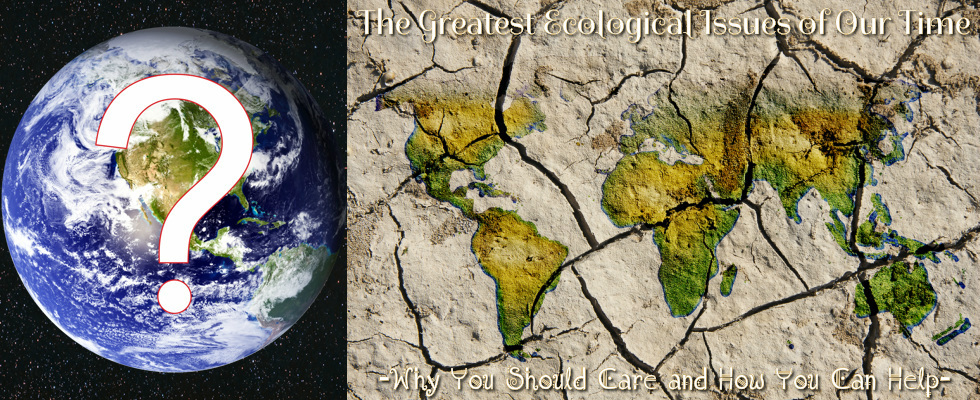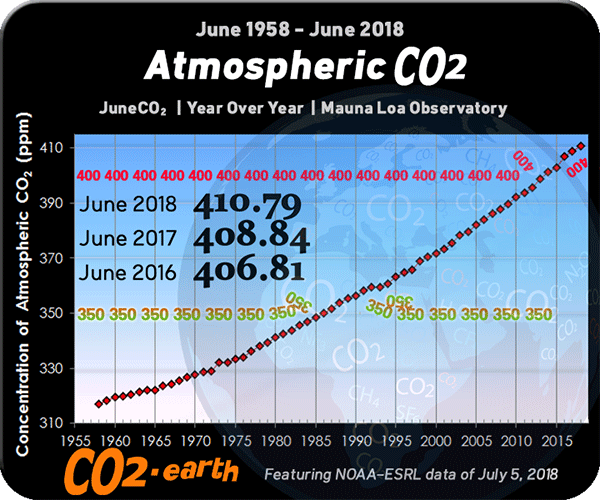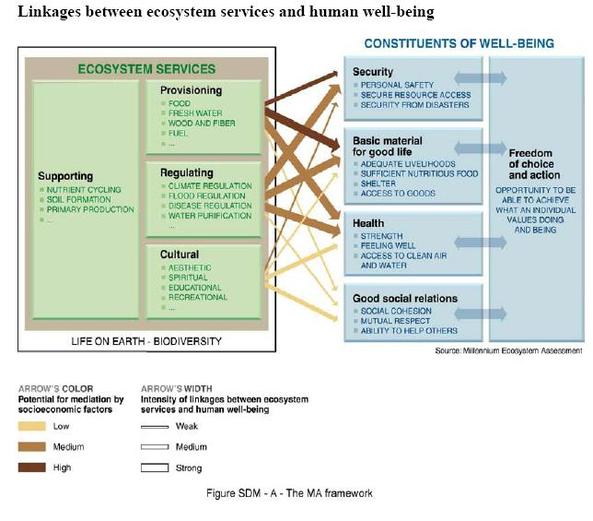Oceans in Peril
Oceans may seem vast and endless, but human activity is impacting every part of our waters and putting the health of the oceans in jeopardy. From the tiny plankton responsible for 2/3 of all the oxygen we breathe, to the beautiful coral reefs protecting our shorelines, to the singing humpback whales, to the seafood we love, immense swaths of the ocean's creatures are being threatened by rapid and non-discriminating forces. Discover the extent of the damage and what you can do about it!
Mass Extinction
Human beings are currently causing the greatest mass extinction of species at rates 1000 to 10,000 times faster than normal. One in four mammals face extinction, along with one in eight birds, one third of all amphibians and 70% of the world's assessed plants. Compared to the natural background rate of one extinction per million species per year, we are now losing 30,000 species per year, or three species per hour. If present trends continue, scientists warn that within a few decades, at least half of all plant and animal species on Earth will be extinct.
Global Warming
Every national academy of science of every major country in the world agrees. Every professional scientific society in every field related to the field of climate endorses it. 97-98 percent of all scientists that are most active in publishing in the field of climate science agree with it. The consensus is unequivocal: human activities are causing climate change. Discover the evidence, scientific consensus and effects of global warming.
Pollution
Pollution can take many forms: the air we breathe, the water we drink, the soil we use to grow our food, the lit-up skies and even the increasing noise we hear every day all contribute to health problems and a lower quality of life with major disruptions and effects on wildlife and ecosystems. One of the greatest problems that the world is facing today is that of environmental pollution, which is causing grave and irreparable damage to human society and the natural world. A polluted environment is a polluted society - one we created and one only we can renew.
Waste
There are many types of waste, including municipal, hazardous, electronic, bio-medical, radioactive, industrial and more. Waste can contaminate surface water, groundwater, soil, and air which causes serious problems for humans, other species and ecosystems. Learn about the problems and solutions associated with landfills, e-waste, incineration and litter.
Habitat Loss
Every day there are fewer places left that wildlife can call home. Protecting and preserving the habitats that wildlife need in order to survive runs parallel to protecting the future of humanity. We depend directly on natural habitats for essential, irreplaceable ecosystem services and on key species, such as pollinators, for countless needs and benefits, but indirectly on all other species for the simple reason that everything, wild or not, connects. Replacing natural habitats with unnatural habitats that depend on natural habitats, yet destroy them at alarming rates - far faster than they can replenish themselves - is a recipe for disaster. A recipe that can only continue to brew for so long.
Overpopulation
Human population is growing at a rate of approximately 78 million people per year with over 7 billion people living on the planet today and estimates reaching between 8 and 11 billion by 2050 and up to 15 billion by 2100. According to Steve Jones, head of the biology department at University College London, "Humans are 10,000 times more common than we should be." Human overpopulation is among the most pressing environmental issues, silently aggravating the forces behind global warming, environmental pollution, habitat loss, the sixth mass extinction, intensive farming practices and the consumption of finite natural resources, such as fresh water, arable land and fossil fuels, at speeds faster than their rate of regeneration.
Intensive Farming
Intensive farming practices produce more and cheaper food per acre and animal, which has helped feed a booming human population and may prevent surrounding land from being converted into agricultural land, but has grown to become the biggest threat to the global environment through the loss of ecosystem services and global warming and has led to the emergence of new parasites and re-emergence of parasites previously considered to be 'under control' by creating the conditions for parasite growth. Explore the challenges facing our food system, the effects we bear and what we can do about it.
Fossil Fuels
Our global fossil fuel infrastructure and dependence has led to a vast, interconnected web of issues by undermining the stability of Earth's climate, harming the health of countless people around the world, polluting and destroying marine and terrestrial habitats, corrupting politics with dirty energy money, leading to energy insecurity, debt and poverty, blocking a clean energy transition and increasing human rights abuses, war and national security concerns. These true energy costs are not included in consumer utility or gas bills, nor are they paid for by the fossil fuel companies that produce or sell the energy. They are simply and traditionally considered external to the energy pricing system, which masks the true costs of fossil fuels by referring to the effects of their byproducts as 'negative externalities' and allowing society as a whole to pay for them with our health, our polluted environment and the long-term degradation of our economy.
Nuclear Energy
Proponents of nuclear energy, such as the World Nuclear Association, argue that nuclear power is a sustainable energy source which reduces carbon emissions, increases energy security, produces virtually no conventional air pollution and produces base-load power. However, missing from the seemingly perfect solution to modern-day energy problems are the unnecessary and unacceptable risks and costs associated with nuclear power. Nuclear technology will always be vulnerable to natural disasters, human error, design failures and terrorist attacks and is incredibly expensive and inherently unsafe as it can lead to irreparable damage to ecosystems, wildlife, and humans.
Finite Earth
Despite massive landscapes and endless blue, our planet is limited in its resources and capabilities to support its inhabitants. According to the Global Footprint Network, "Humanity uses the equivalent of 1.5 planets to provide the resources we use and absorb our waste. This means it now takes the Earth one year and six months to regenerate what we use in a year. Moderate UN scenarios suggest that if current population and consumption trends continue, by the 2030s, we will need the equivalent of two Earths to support us. And of course, we only have one. Turning resources into waste faster than waste can be turned back into resources puts us in global ecological overshoot, depleting the very resources on which human life and biodiversity depend."
"Nature is the basis of our well-being and our prosperity. Biodiversity has declined globally by around 30% between 1970 and 2008; By 60% in the tropics. Demand on natural resources has doubled since 1966 and we are currently using the equivalent of 1.5 planets to support our activities. “Business as usual” projections estimate that we will need the equivalent of two planets by 2030 to meet our annual demands. Natural capital – biodiversity, ecosystems and ecosystem services – must be preserved and, where necessary, restored as the foundation of human economies and societies." ~ WWF Living Planet Report 2012
The Environmental Crisis
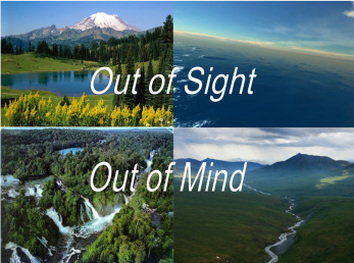
One of the greatest illusions in the world causing most of the devastation we see today is that we are separate from all the forests and all the oceans, that we are separate from all other life on Earth. That we are superior to nature. But the reality is we are part of nature. That above all, we are nature. It can be difficult to understand or remember that we are completely connected to nature because we live in concrete jungles masking the surrounding Earth in a society where products and services continuously replenish inducing the illusion of endless abundance and whose general culture is built on the assumption that we are detached from the natural world with complete dominion over this world and all of its inhabitants. We've evolved incredibly as leaders of the biosphere, but we are largely misleading by living in disharmony from the very foundation that makes our lives and all we do within them possible. Beyond our stunning technological and intellectual advancements, we can clearly see our devastating impacts to the furthest corners of the Earth. Healing the lands and oceans, improving our health and well-being, protecting wildlife and giving our children the future they deserve begins with the inspiration, awareness and knowledge to do so.
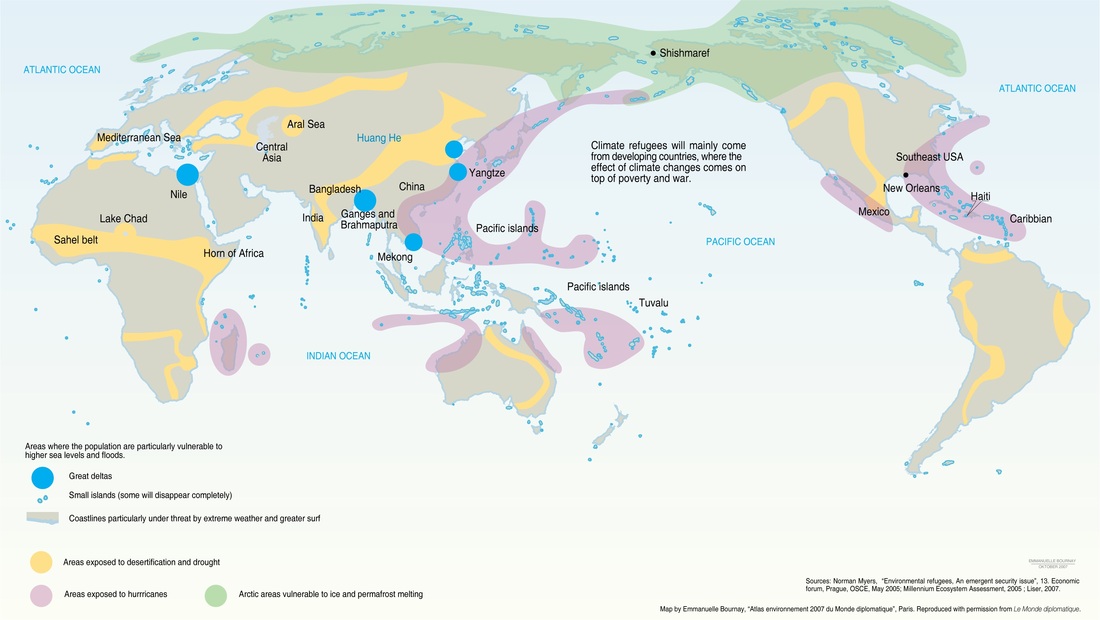
| |
"If the physical scientists who warn about limits to growth are right, confronting the global economic meltdown implies far more than merely getting the banks and mortgage lenders back on their feet. Indeed, in that case we face a fundamental change in our economy as significant as the advent of the industrial revolution. We are at a historic inflection point—the ending of decades of expansion and the beginning of an inevitable period of contraction that will continue until humanity is once again living within the limits of Earth's regenerative systems. But there are few signs that policy makers understand any of this. Their thinking appears to be shaped primarily by mainstream economists' assurances that growth can and must continue into the indefinite future, and that the economic contraction the world is currently experiencing is only temporary—a problem that can and must be solved." ~ Richard Heinberg
The latest projections of socio-economic trends over the next four decades, and their implications for four key areas of concern: climate change, biodiversity, water and the health impacts of environmental pollution. Here are some of the reports most striking warnings:
- Pressures on the planet’s ecosystem are now so great that future generations could face falling living standards.
- The population is expected to increase from roughly 7 billion people today to more than 9 billion in 2050. The global economy is expected to recover from the financial crisis and ultimately quadruple in size. However, the financial cost of failing to address climate change could result in an up to 14% loss in per capita consumption worldwide by 2050, according to some estimates.
- Pollution will become the biggest cause of premature death, killing an estimated 3.6 million people per year by 2050.
- Air pollution alone will be a major killer, overtaking both poor sanitation and a lack of clean drinking water as a global health threat.
- Due to dependence on fossil fuels, carbon dioxide emissions from energy use will grow by 70%, the OECD found. This will help drive up the global average temperature by 3° to 6 ° Celsius by 2100. Not only does this far exceed the internationally agreed-upon global warming limit of two degrees, but three degrees may be the “tipping point” where climate change could run out of control, scientists say.
- Because the population will grow so dramatically, there will be a 55% increase in demand for water, and 40% of the world’s population will be living under severe water stress.
- Groundwater depletion will be the biggest threat to agriculture and to urban water supplies, while pollution from sewage and waste water—including chemicals used in cleaning—will put further strain on global water supplies.
- Biodiversity will decline by 10% on land, with the worst impacts felt in Asia, Europe and southern Africa.
"The natural environment performs for us, free of charge, basic services without which our species could not survive. The ozone layer screens out ultraviolet rays from the sun that harm people, animals and plants. Ecosystems help purify the air we breathe and the water we drink. They convert wastes into resources and reduce atmospheric carbon levels that would otherwise contribute to global warming. Biodiversity provides a bountiful store of medicines and food products, and it maintains genetic variety that reduces vulnerability to pests and diseases. But we are degrading, and in some cases destroying, the ability of the environment to continue providing these life-sustaining services for us." ~ UN Millennium Ecosystem Assessment350.org: The Basics of Climate Change Science
Half the world's population could face a shortage of clean water by 2080 due to climate change. The U.N. Intergovernmental Panel on Climate Change found that as many as 2 billion people won't have sufficient access to clean water by 2050. That figure is expected to rise to 3.2 billion by 2080 — nearly tripling the number who now do without it. Learn more.

